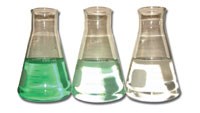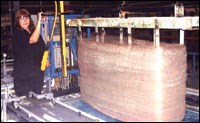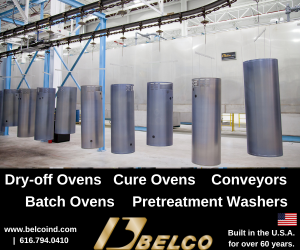Easy Waste Treatment for Spent EN Baths
Anyone who plates electroless nickel in their shop knows the difficulties inherent with trying to waste treat spent EN baths in-house.
Anyone who plates electroless nickel in their shop knows the difficulties inherent with trying to waste treat spent EN baths in-house. Whether low-, mid-, or high-phosphorus, electroless nickel baths are highly complexed and chelated baths that "tie up" nickel and any other metals that happen to become dissolved in the bath. Conventional neutralization and precipitation methods are marginally effective at best and always pose the threat of that dreaded effluent limit exceedence.
Another way of treating spent EN baths that has increased in popularity recently is not to treat them in-house at all but to have them sent off-site for treatment or landfill. This not only poses liability risks in the over-the-road transportation and cradle-to-grave ownership (if the waste is landfilled) of the spent baths, but in some states it must also be reported as a waste that leaves your facility.
Besides the obvious environmental liability and reporting issues associated with sending your spent EN baths off-site, the costs can also be substantial. Typical costs to have an EN bath "recycled" for its nickel content run from $1.00-1.30 per gal of spent bath plus freight. Costs for landfilling are somewhat cheaper, running around $0.45-0.70 per gal plus freight, but carry the burden of the cradle-to-grave liability. These costs can quickly add up. A single 300-gal EN bath that is "dumped" once per week and sent out for recycling could cost your company in excess of $20,000 per year, not to mention the reporting of more than 15,000 gal of nickel waste shipped off-site.
There exists another less expensive, more environmentally friendly method of treating spent EN baths in house that solves all of the above issues and is currently employed at Tompkins Metal Finishing (Batavia, NY).
Tompkins is a large job shop EN plater, aluminum finisher and powder coater established in 1955. The initial business design was the manufacture and coating of magnetic tape reels. After the magnetic tape industry went into decline, and Tompkins started selling excess capacity on its finishing lines for outside work, its focus quickly shifted to job shop plating and powder coating. Today, the company plates anything from automotive to industrial to military items.
Tompkins is a family owned business managed by the father/son team of John and Allen Tompkins. Bill Schuler is the general manager in charge of overall day-to-day operations, and Paula Stablewski is the electroless nickel line manager. The business philosophy is very progressive, which extends to the approach to environmental issues. When Tompkins began looking for ways to reduce waste and costs, EN bath disposal took top priority.
Tompkins was sending out more than 11,000 gal of spent EN baths per year, which was expensive in itself, not to mention all the resulting costs, paperwork and liability issues. Not only did they want to reduce or eliminate this burden, it also had a strong desire to become a "greener" company. The only problem was that there were few, if any, options available that were accepted industry wide.
So, when Sirius Technology approached Tompkins with its "Controlled Plate-Out" process for treating spent EN baths and offered a free trial, Tompkins was somewhat apprehensive. After all, plating out EN baths had been tried before, usually with less than satisfactory results. Bath decomposition, sludge generation and final nickel concentrations in excess of 50 ppm were routine for standard plate-out procedures. However, Tompkins' desire to eliminate the spent nickel waste stream overcame its apprehension. And, after the trial bath plate-out was completed in less than 3 hours with final nickel concentrations less than 3 ppm, the management at Tompkins knew it had a winner.
Today, Tompkins does not send out its spent EN baths, and its costs have been reduced substantially. In addition, the plate-out procedure is easy enough for its line operators to perform during their routine shift, with no extra down time.
The basic procedure behind this practical and cost saving approach to the waste treatment of spent EN baths is simply to plate all the nickel out of the bath. The nickel in the bath is plated onto steel wool until the concentration is below 2-3 ppm. Obviously, this could not be done in an efficient manner using standard EN plating rates; the plate-out would take too long. Using proprietary techniques and a specialized waste treatment "additive," the plating speed is accelerated so that the entire process can be done within 3 hours. No special equipment is needed except for a method to hold the steel wool in solution, usually a rack or basket. The procedure can be performed in the plating tank itself.
After the procedure is completed, a white water solution at a near neutral pH and nickel concentration below 3 ppm is all that remains. There is no sludge; only nickel-plated steel wool that can be sold for its nickel value remains. Leftover solution can be sent to the POTW as long as the pH is okay and there are no phosphorus restrictions. And the cost for the entire procedure is somewhere around $0.40 per gal.
A simple yet cost effective and efficient approach to waste treatment.
Read Next
Episode 45: An Interview with Chandler Mancuso, MacDermid Envio Solutions
Chandler Mancuso, technical director with MacDermid Envio discusses updating your wastewater treatment system and implementing materials recycling solutions to increase efficiencies, control costs and reduce environmental impact.
Read MoreDelivering Increased Benefits to Greenhouse Films
Baystar's Borstar technology is helping customers deliver better, more reliable production methods to greenhouse agriculture.
Read MoreEducation Bringing Cleaning to Machining
Debuting new speakers and cleaning technology content during this half-day workshop co-located with IMTS 2024.
Read More















.jpg;maxWidth=300;quality=90)





